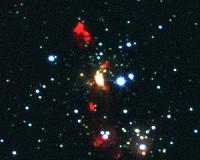 |
New Haven CT (SPX) Dec 02, 2010 Astronomers have discovered that small, dim stars known as red dwarfs are much more prolific than previously thought - so much so that the total number of stars in the universe is likely three times bigger than realized. Because red dwarfs are relatively small and dim compared to stars like our Sun, astronomers hadn't been able to detect them in galaxies other than our own Milky Way and its nearest neighbors before now. As such, they did not know how much of the total stellar population of the universe is made up of red dwarfs. Now astronomers have used powerful instruments on the Keck Observatory in Hawaii to detect the faint signature of red dwarfs in eight massive, relatively nearby galaxies called elliptical galaxies, which are located between about 50 million and 300 million light-years away. They discovered that the red dwarfs, which are only between 10 and 20 percent as massive as the Sun, were much more bountiful than expected. "No one knew how many of these stars there were," said Pieter van Dokkum, a Yale University astronomer who led the research, which is described in Nature's Advanced Online Publication. "Different theoretical models predicted a wide range of possibilities, so this answers a longstanding question about just how abundant these stars are." The team discovered that there are about 20 times more red dwarfs in elliptical galaxies than in the Milky Way, said Charlie Conroy of the Harvard-Smithsonian Center for Astrophysics, who was also involved in the research. "We usually assume other galaxies look like our own. But this suggests other conditions are possible in other galaxies," Conroy said. "So this discovery could have a major impact on our understanding of galaxy formation and evolution." For instance, Conroy said, galaxies might contain less dark matter - a mysterious substance that has mass but cannot be directly observed - than previous measurements of their masses might have indicated. Instead, the abundant red dwarfs could contribute more mass than realized. In addition to boosting the total number of stars in the universe, the discovery also increases the number of planets orbiting those stars, which in turn elevates the number of planets that might harbor life, van Dokkum said. In fact, a recently discovered exoplanet that astronomers believe could potentially support life orbits a red dwarf star, called Gliese 581. "There are possibly trillions of Earths orbiting these stars," van Dokkum said, adding that the red dwarfs they discovered, which are typically more than 10 billion years old, have been around long enough for complex life to evolve. "It's one reason why people are interested in this type of star."
Share This Article With Planet Earth
Related Links Yale University Astronomy News from Skynightly.com
 Massive Galaxies Formed When Universe Was Young
Massive Galaxies Formed When Universe Was YoungSomerville MA (SPX) Nov 25, 2010 Some of the universe's most massive galaxies may have formed billions of years earlier than current scientific models predict, according to surprising new research led by Tufts University. The findings appear in the Astrophysical Journal published online. "We have found a relatively large number of very massive, highly luminous galaxies that existed almost 12 billion years ago when the uni ... read more |
|
| The content herein, unless otherwise known to be public domain, are Copyright 1995-2010 - SpaceDaily. AFP and UPI Wire Stories are copyright Agence France-Presse and United Press International. ESA Portal Reports are copyright European Space Agency. All NASA sourced material is public domain. Additional copyrights may apply in whole or part to other bona fide parties. Advertising does not imply endorsement,agreement or approval of any opinions, statements or information provided by SpaceDaily on any Web page published or hosted by SpaceDaily. Privacy Statement |